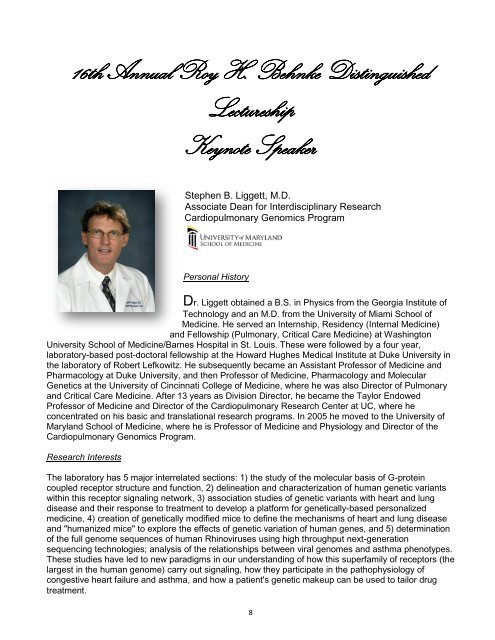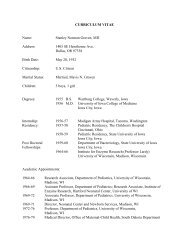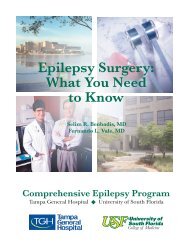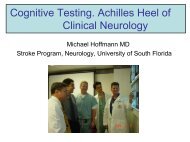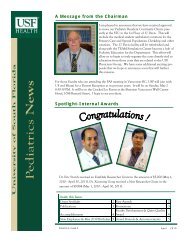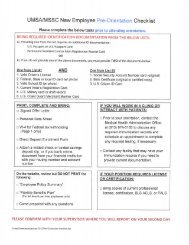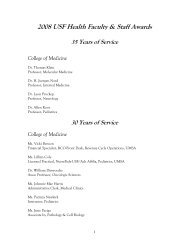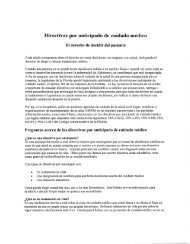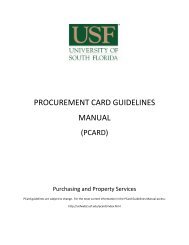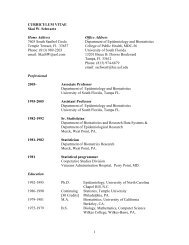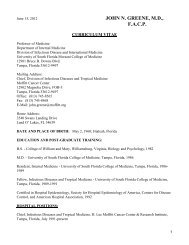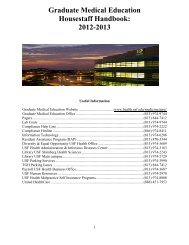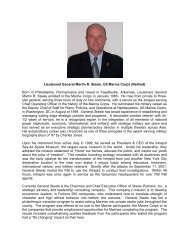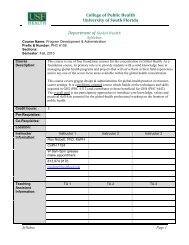2012 USF Health Research Day Virtual Book
2012 USF Health Research Day Virtual Book
2012 USF Health Research Day Virtual Book
You also want an ePaper? Increase the reach of your titles
YUMPU automatically turns print PDFs into web optimized ePapers that Google loves.
16th Annual Roy H. Behnke Distinguished<br />
Lectureship<br />
Keynote Speaker<br />
Stephen B. Liggett, M.D.<br />
Associate Dean for Interdisciplinary <strong>Research</strong><br />
Cardiopulmonary Genomics Program<br />
Personal History<br />
Dr. Liggett obtained a B.S. in Physics from the Georgia Institute of<br />
Technology and an M.D. from the University of Miami School of<br />
Medicine. He served an Internship, Residency (Internal Medicine)<br />
and Fellowship (Pulmonary, Critical Care Medicine) at Washington<br />
University School of Medicine/Barnes Hospital in St. Louis. These were followed by a four year,<br />
laboratory-based post-doctoral fellowship at the Howard Hughes Medical Institute at Duke University in<br />
the laboratory of Robert Lefkowitz. He subsequently became an Assistant Professor of Medicine and<br />
Pharmacology at Duke University, and then Professor of Medicine, Pharmacology and Molecular<br />
Genetics at the University of Cincinnati College of Medicine, where he was also Director of Pulmonary<br />
and Critical Care Medicine. After 13 years as Division Director, he became the Taylor Endowed<br />
Professor of Medicine and Director of the Cardiopulmonary <strong>Research</strong> Center at UC, where he<br />
concentrated on his basic and translational research programs. In 2005 he moved to the University of<br />
Maryland School of Medicine, where he is Professor of Medicine and Physiology and Director of the<br />
Cardiopulmonary Genomics Program.<br />
<strong>Research</strong> Interests<br />
The laboratory has 5 major interrelated sections: 1) the study of the molecular basis of G-protein<br />
coupled receptor structure and function, 2) delineation and characterization of human genetic variants<br />
within this receptor signaling network, 3) association studies of genetic variants with heart and lung<br />
disease and their response to treatment to develop a platform for genetically-based personalized<br />
medicine, 4) creation of genetically modified mice to define the mechanisms of heart and lung disease<br />
and "humanized mice" to explore the effects of genetic variation of human genes, and 5) determination<br />
of the full genome sequences of human Rhinoviruses using high throughput next-generation<br />
sequencing technologies; analysis of the relationships between viral genomes and asthma phenotypes.<br />
These studies have led to new paradigms in our understanding of how this superfamily of receptors (the<br />
largest in the human genome) carry out signaling, how they participate in the pathophysiology of<br />
congestive heart failure and asthma, and how a patient's genetic makeup can be used to tailor drug<br />
treatment.<br />
8


